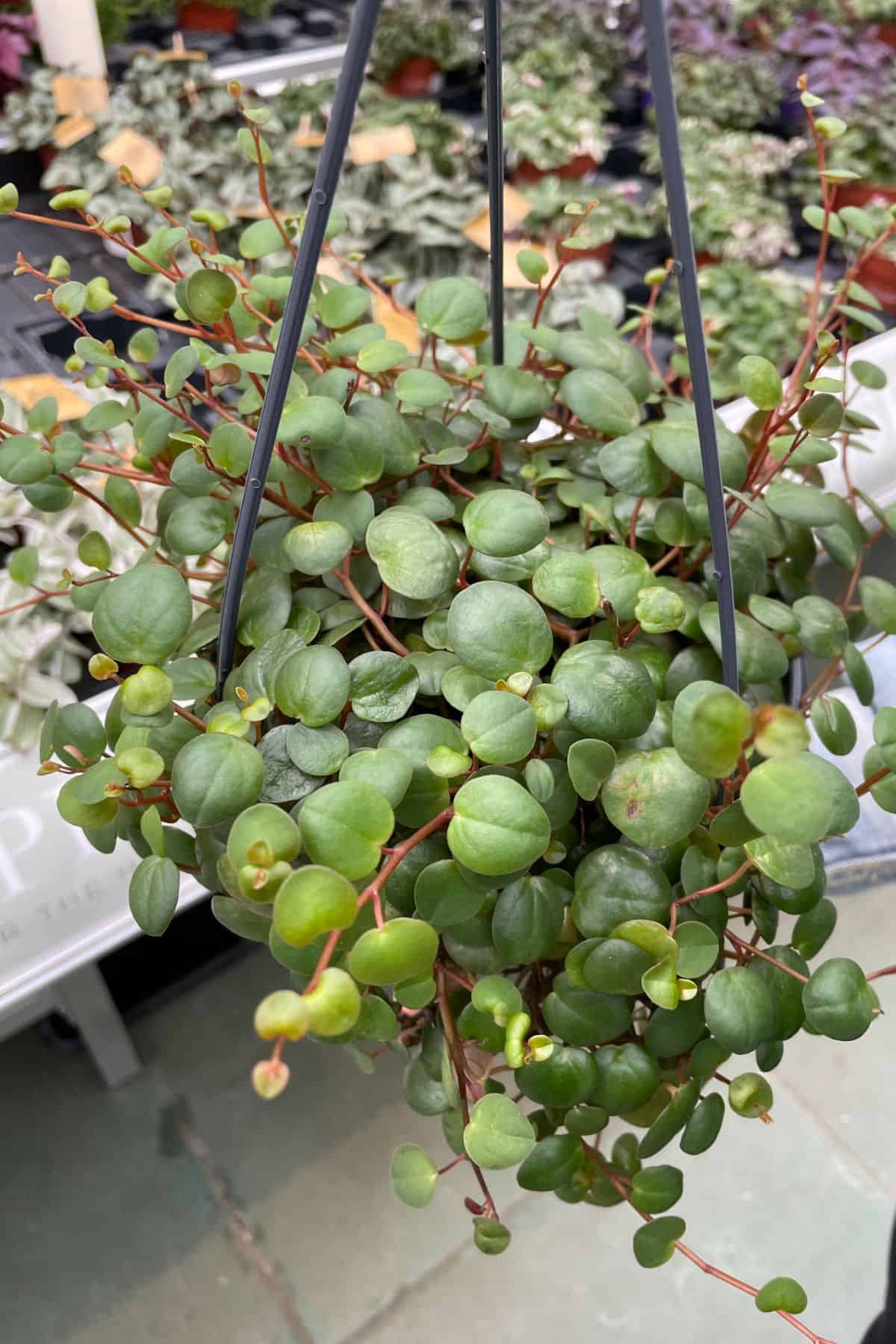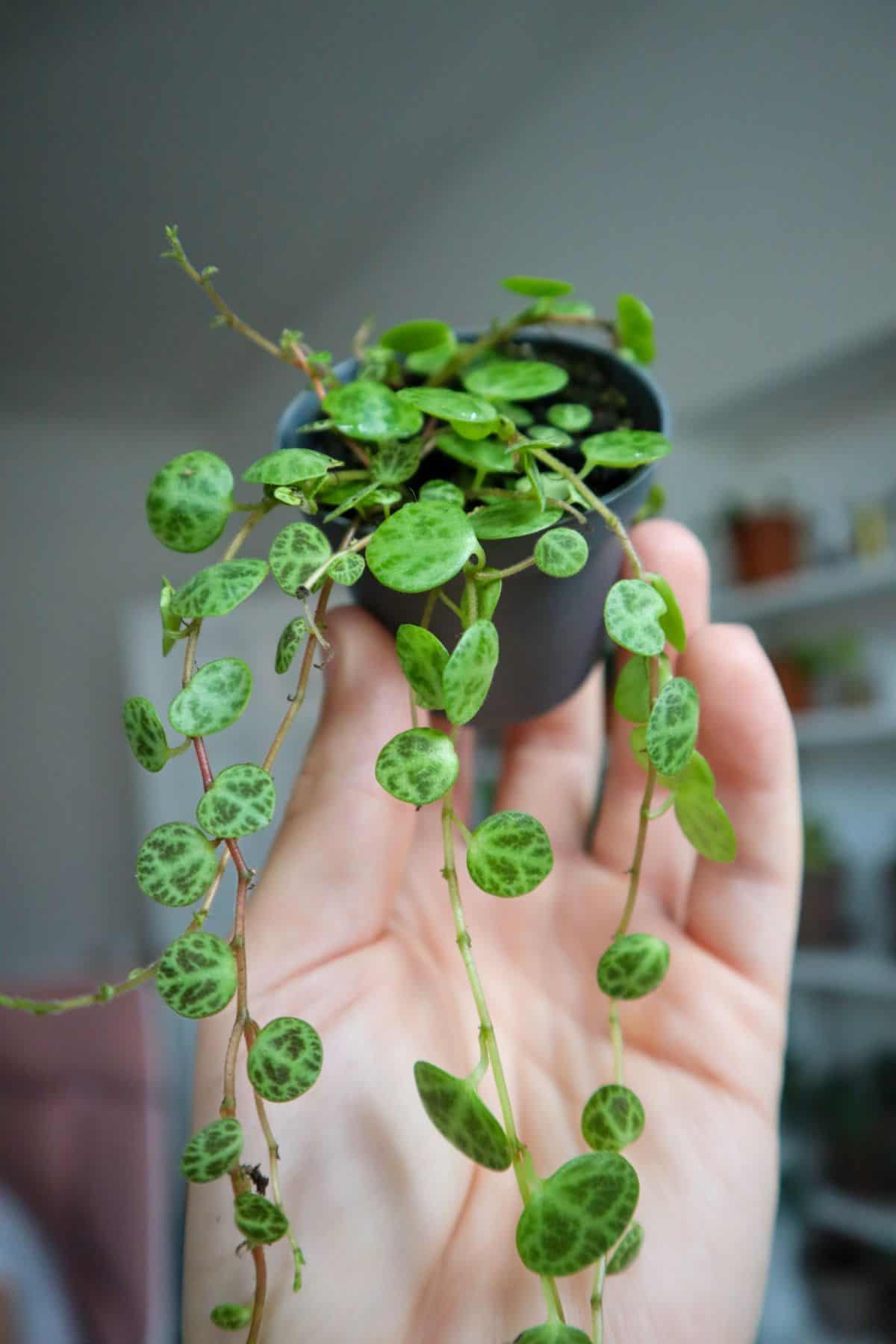The Peperomia ‘Pepperspot’ is an adaptable vine that brings tonnes of personality to the party.
While frequently mislabeled as a type of Peperomia rotundifolia, it’s actually a non-variegated variety of Peperomia prostrata (which you may know as the popular String of Turtles).
Unlike their Turtle sisters, Pepperspots keep a consistent coloring rather than bright veins or variegation. The round leaves grow into a dark forest green, juxtaposing the pinkish-red vines and undersides.
Its tendency to spill out in all directions, however, remains just as prominent.
Earning the common name, the String of Coins.
You don’t need money to enjoy these coins – just a little expertise, so read on to find out all the care info you need.

Where to Buy Peperomia Pepperspot
See the links below to purchase from reputable terrarium plant shops and marketplaces (may include affiliate links).
String of Coins Care & Growth
| Plant Type | Foliage, vine |
| Lighting | Moderate indirect light |
| Temperature | 65-80°F (18-26°C) |
| Watering | Moderate, even moisture |
| Humidity | Moderate humidity (50-80%) |
| Growth | 5-15 inches |
Lighting
A typical tropical species, Peperomia ‘Peperspot’ loves its fair share of bright, indirect light.
And as you’d also expect, it can quickly scorch in direct sunlight.
Assuming you live in the Northern Hemisphere like me, get that baby straight to a North or East-facing windowsill. Conversely, if you live below the equator, a South or West-facing window is best.
If in doubt, this species can tolerate lower light conditions, too. So you can always keep it a few feet away from the light source to be extra safe.

Watering
Like many Peperomia species, the String of Coins plant grows epiphytically attached to trees in its natural habitat.
While they are lovers of regular water, these tropical wonders go through a soak-dry-soak-dry cycle in the wild. This is reflected in their semi-succulent leaves that retain moisture, so you can be confident they’ll tolerate drying out a little between waterings.
The most common problem with this plant is overwatering. The roots are highly susceptible to root rot and can’t tolerate being sat in wet substrate.
Using a pot with drainage holes (or building a drainage layer into your terrarium) will massively counteract this problem.

Substrate
As a natural epiphyte, you’d be forgiven for thinking the String of Coins would be relatively unfussy when it comes to substrate.
While that line of thinking isn’t entirely inaccurate (a range of mixes could work with this plant), its epiphytic status makes the need for a light, well-draining substrate mix all the more important.
A coco coir based mix is best, with elements such as perlite, pumice, lava rock, and orchid bark being necessary to provide the much-needed aeration and drainage.

Adding an organic fertilizer element to your substrate will be appreciated, too; nutrient-rich earthworm castings are my go-to.
Temperature & Humidity
Despite calling the tropical Amazon jungles of South America its home, the Pepperspot is actually reasonably hardy.
Naturally, it has a preference for warm temperatures and high levels of humidity, but it’ll do just fine as long as you keep the humidity over 50% and the temperature over 65°F.

Hardiness aside, it’ll love you forever if you put it in a closed terrarium.

Consistency is key here; drafts or sudden shifts in temperature or humidity wouldn’t be welcomed.
Yes, members of the Peperomia genus are often called “Radiator Plants,” but that isn’t an invitation to place your plant near one.
Growth
Peperomia prostrata ‘Pepperspot’ is unlikely to outgrow your average terrarium, but it does love to stretch its unruly vines in all directions.
That’s why these plants look wonderful on the floors of terrariums where they creep across the container. Or, once mature enough, they can be enjoyed as a dramatic waterfall of vines in the background.
Personally, I’ve found that it looks most beautiful as a big bushy plant or a dainty accent vine, so feel free to cut it back as you like to keep it in shape.
Equally, propagating cuttings to make it bushier is never a bad idea.

It can look a bit scraggly and thin if left unchecked. It doesn’t help that when kept as a houseplant, it can all too easily get tangled.

The String of Coins isn’t a particularly slow or fast grower, and as a typical Peperomia, it can flower with those signature green spikes, too.
To promote leaf growth instead, you can cut them off when they pop up.
Propagation
As with most Peperomia, the String of Coins is easily propagated with stem cuttings, so start by grabbing those scissors and giving your plant a haircut.

Then, if you want to go the water propagation route, remove a few lower leaves and set the stems in a glass of water.
No rooting hormone necessary.
When roots have established in a month or two, they can be planted separately or planted directly back into the mother plant to increase bushiness.
Alternatively, the Pepperspot is one of those brilliant species that will root up readily in a humid terrarium environment.
You can place a cutting on top of empty substrate, moss, or a moist hardscape piece (such as porous lava rock) and let it root itself into the space over the coming weeks.

Varieties & Similar Plants
Of course, the most notable Peperomia prostrata variety is the beautifully variegated String of Turtles.

There’s also the lovely ‘Ruby Cascade,’ which looks 100% like a prostrata (in my opinion) despite being unable to find a scientific name anywhere. It’s very similar to the Pepperspot, with deeper red/burgundy undersides and stems.
The Peperomia genus is a family of over 1,500 other recorded plants, and it’s constantly expanding with new discoveries and classifications.
For other vining types, see *Peperomia* ‘Hope’ and Peperomia rotundifolia, or for more reddish coloring out Peperomia Rosso, which has a more compact foliage type.
Or, keeping with the “strings of X currency” theme, why not check out the String of Nickels (Dischidia nummularia)?
